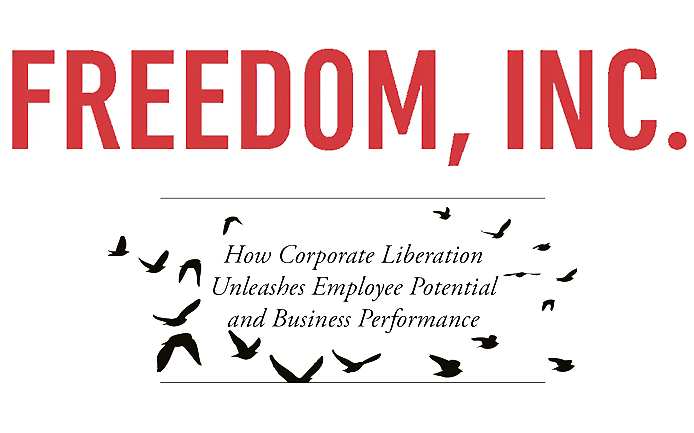Liberating Leaders, Liberated Companies
by Isaac Getz
SUMMER, 2010
Is it farfetched to think of most companies as walking on their hands—that is, upside down? Consider the mistrust, disengagement, and stress rampant in today’s workplaces, and visions of corporate handstands don’t seem so fanciful. Skilled hand-walkers are genuinely impressive, but no one expects a great deal of forward momentum. It’s enough of an achievement to remain upright. Only 2 percent of U.S. companies significantly outperform their competition over a period of a decade, and just 1 percent survive forty years without either going bankrupt or being acquired.
Is this news? Not really. Employees know it: After all, they are the (aching) hands. Managers know it too: Not trusting the hands with walking, they must keep their noses to the floor to monitor them. Finally, shareholders and other stakeholders know it too, so insufficient is the average performance. If this looks absurd enough, why do so few companies challenge the way they walk?
Employees can’t do much, since it’s not them who organize walking. Managers are busy with motivational sticks and carrots. And the unhappy stakeholders? They can’t do much apart from urging the occasional lopping-off of an executive head. So it’s up to executives, most of whom are well aware of the problem: Studies show that the average executive believes his organization is functioning at about 60 percent of its productivity potential. Why, then, do so few let their employees run on their feet—freeing them to self-direct their actions for the good of the company?
This mystery drove four years of research that brought me and my co-author Brian Carney close to thirty companies in which employees are free and responsible to take actions that they—not their bosses or some procedures—decide are the best for the company. We called these companies “Freedom Inc.’s,” and although we observed their functioning and extracted some commonalities among them, our focus was deeper: their emergence. We found that every successful Freedom Inc. has been initiated and built by one person at its top, whom we dubbed a liberating leader. We interviewed these current or former CEOs or owners looking to understand what exactly they did, and we can summarize liberating leadership in the following four principles:
They stopped telling people how to do their work and started listening to their solutions. Then they removed all the other symbols and practices that prevented their people from feeling intrinsically equal.
They started openly and actively sharing their vision of the company so people would “own” it. But they didn’t do this before the first step, because people who are not treated as equals—with respect, fairness, and trust—leave their leaders alone with their vision.
They stopped motivating people. That is, they stopped using carrots—and sticks—to make people do what they are disinclined to do. Instead, they built an environment that allowed people to grow and self-direct—and let them motivate themselves.
They stayed alert. To keep their company free, they became the culture-keepers. In this role, as Radica Games co-founder Bob Davids says, “one drop of urine in the soup is too much—and you can’t get it out.” The price of liberty is eternal vigilance.
Those are general liberating leadership principles, but each liberating leader we studied had to apply them to his own unique set of circumstances—and so can others. In other words, this isn’t a formula, a tool, a technique. As a British saying goes, “a fool with a tool is still a fool.” This leads us to the question of whether the liberating leaders who successfully applied those principles possess some distinguishing features.
Among the leaders we studied, we found no such features in terms of their social origins, education, or professional experience. However, we did find three distinguishing character and psychological traits: egalitarian values—respect, dignity, consideration, trust, fairness, equity; creativity—an ability to redefine problems; and wisdom—holistic (considering all of the ways in which one problem may be related to its surrounding circumstances) and dialectical (entertaining both sides of an apparent contradiction) thinking style. The combination of these traits is rare, which partly explains why there are so few liberating leaders. But there is more. Having some traits is a predisposition; a leader must live certain experiences to fulfill it.
Bob Davids, whose intellectual mentor was Up the Organization guru Robert Townsend, remarked to us that “the people who are already predisposed to such leadership can easily get the concept but maybe not put it into practice.” It’s natural for a leader holding egalitarian values to become highly critical of an organization that consistently violates them. Yet criticism rarely triggers action. We found that these triggers stem from two fundamental emotional experiences: exasperation with traditional command-and-control organizations and admiration of freedom-based ones.
So that’s where liberation campaigns originate: with heads of companies whose egalitarian values lead them to exasperation with organizational cultures of hand-walking and admiration for those that run free and fast. At that point, their creativity and wisdom allows them to successfully master the liberating-leadership process. This isn’t easy, of course, which is why there are so few liberating leaders. But companies with continuous outstanding performance over time are similarly rare, and liberating leadership is one way to get there. It has an important advantage over other ways: In every Freedom Inc., outstanding performance is reached through people’s happiness—not through the lack of it. And it begins with turning the company right side up.
Reposted from (where more material is available)








